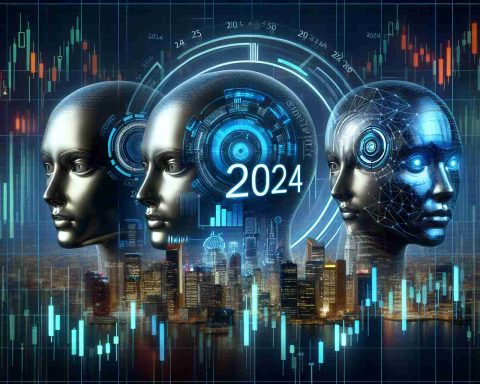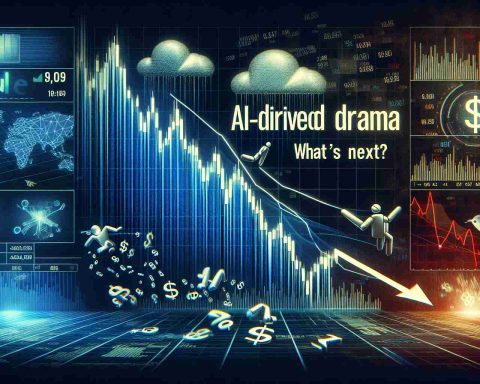BlackRock and the AI Revolution: What’s Next?
In the dynamic world of artificial intelligence, BlackRock recently unveiled its top 30 AI stocks, and Apple Inc. remains a key player in this evolving landscape. As we approach the latter part of 2024, BlackRock has observed a cautious sentiment among investors regarding the pace of AI investments by tech giants. This has prompted a diversification towards assets in energy, utilities, and real estate linked to AI infrastructure.
In September, a collaboration was announced between BlackRock, Microsoft, Global Infrastructure Partners, and MGX to invest in essential data centers and energy frameworks. This initiative aims to bolster the United States’ competitive edge in AI while addressing the rising demands for energy infrastructure vital for economic growth. Additionally, BlackRock has introduced two new exchange-traded funds (ETFs) to capitalize on the AI investment wave, enhancing its service offerings amid growing market interest.
Remarkably, BlackRock reported a net profit of $6.37 billion last year, showing a 16% increase from 2023. This growth can be significantly attributed to advancements in AI technologies, with projections indicating that AI will play a crucial role in driving U.S. economic expansion in 2025. The report highlights that investments in AI-related infrastructure are as critical now as those during the Industrial Revolution.
In a related note, JPMorgan has encouraged investors to seek opportunities across the AI value chain, emphasizing careful evaluation of earnings potentials rather than merely following trends within the mega-cap tech stocks.
The Broader Implications of AI Investments
The rapid advancement of artificial intelligence (AI) heralds a transformative period for society and the economy. Companies like BlackRock, by investing heavily in AI stocks and infrastructure, are not just shaping financial markets, but also creating a ripple effect that impacts employment, education, and how industries operate globally. As technology evolves, there is a growing demand for skilled professionals capable of navigating and integrating AI into existing workflows. This trend underscores the necessity for upskilling in the workforce, reflecting a shift in educational paradigms to support the needs of an AI-driven economy.
The environmental implications of AI investment cannot be overlooked either. While AI offers solutions for more efficient energy usage and resource management, the demand for energy-intensive data centers raises concerns about sustainability. The projected expansion in AI infrastructure will likely necessitate increased energy consumption, urging stakeholders to prioritize renewable energy solutions. A misalignment could exacerbate climate change challenges, emphasizing the need for a balanced approach that promotes both technological advancement and environmental stewardship.
Looking ahead, the integration of AI in various sectors suggests potential long-term significance. AI’s capability to enhance productivity and optimize operations may lead to unprecedented economic growth, reshaping traditional business models and consumer behaviors. However, this swift evolution necessitates continuous dialogue on ethical considerations and equitable access to these advancements to avoid widening the socioeconomic divide. The future of AI, while promising, must also be navigated with vigilance to ensure a sustainable and inclusive global economy.
BlackRock’s Strategic Moves in the AI Landscape: Insights and Future Trends
BlackRock and the AI Revolution: What’s Next?
As artificial intelligence continues to reshape various industries, BlackRock stands at the forefront with significant investments aimed at leveraging AI’s transformative potential. With their recent unveiling of the top 30 AI stocks, BlackRock emphasizes the importance of strategic investment in this sector, notably keeping Apple Inc. as a prominent player in AI technology.
Key Investments and Collaborations
One of the most substantial moves by BlackRock includes a partnership with tech giants like Microsoft and infrastructure firm Global Infrastructure Partners to invest in essential data centers and energy frameworks. This collaboration signifies a robust strategy to enhance the U.S.’s competitive positioning in the AI landscape, while also addressing the critical energy infrastructure demands necessary to support continued economic growth.
Newly Launched ETFs
In alignment with growing market interest, BlackRock has introduced two new exchange-traded funds (ETFs) centered around AI investments. These funds provide investors with diversified options for capitalizing on the burgeoning AI sector, making it easier to invest in a variety of companies involved in AI technologies and applications.
Economic Impact and Projections
BlackRock’s recent financial results underscore the potential impact of AI on economic performance. The firm’s reported net profit of $6.37 billion represents a 16% rise compared to the previous year, attributed largely to advancements in AI technology. Analysts predict that AI will be a key driver of economic growth in the U.S. by 2025, highlighting the significance of investing in AI infrastructure—a move reminiscent of the investments seen during the Industrial Revolution.
Tips for Investors: Navigating the AI Landscape
For investors looking to make informed decisions in the AI sector, JPMorgan suggests taking a comprehensive approach by examining opportunities across the entire AI value chain. Here are some considerations:
– Evaluate Earnings Potential: Instead of following trends based on popular tech stocks, focus on understanding the earnings capabilities of companies involved in AI.
– Diversify Investments: Look for a mix of sectors influenced by AI advancements, such as energy, utilities, and real estate connected to AI infrastructure.
Pros and Cons of Investing in AI
Pros:
– Potential for High Returns: Early investments in AI companies may yield substantial profits as the technology continues to evolve.
– Economic Growth: AI is projected to significantly contribute to economic expansion, increasing the overall market value.
Cons:
– Market Volatility: The tech sector can experience sharp fluctuations, making investments risky.
– Future Uncertainty: Rapid changes in AI technology could render specific investments obsolete.
Security Aspects and Challenges
Investing in AI does come with its own set of security challenges. Companies developing AI technologies must also focus on cybersecurity measures to protect their innovations. As AI systems become more prevalent in critical infrastructure, ensuring their security will be vital to preventing disruptions and safeguarding sensitive data.
Looking Ahead: Predictions and Trends
As we approach 2025, analysts anticipate that AI will be fully integrated across various sectors, leading to significant shifts in workplace dynamics and consumer behavior. Furthermore, with ongoing developments in AI technology, investors will need to stay updated on the latest trends, exploring new opportunities that arise from innovations in AI applications and infrastructure.
For more insights and updates on the evolving AI landscape, check out BlackRock.
In summary, as BlackRock intensifies its focus on AI investments amidst a climate of caution from investors, the strategies undertaken may not only influence the company’s trajectory but also signal broader trends in the financial industry’s approach to artificial intelligence.


















